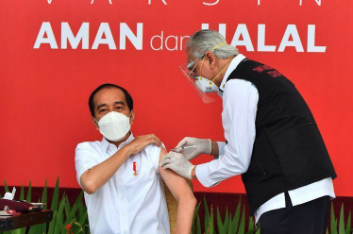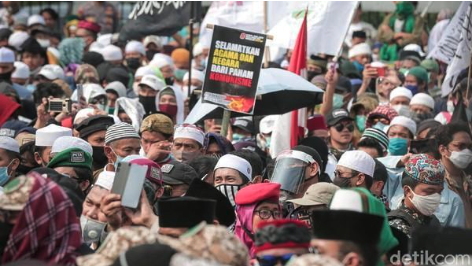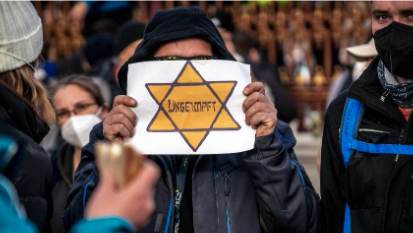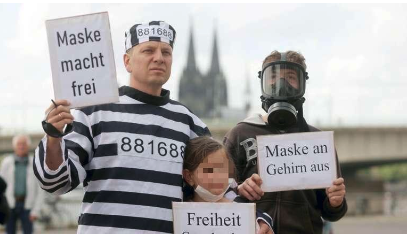Introduction
COVID-19 social restrictions provided fertile ground for extremists around the world. During lockdown, as people spent significantly more time online, so too did violent extremist actors, who continued their propaganda, recruitment, and fundraising efforts. Indonesia, for example, saw a surge in terrorism arrests, jumping from 57 arrests pre-pandemic to 370. Similarly, Germany saw a rise in far-right extremism, with 40% of the 33,000 far-right extremists classified as ‘violent’. Extremists not only defied lockdown regulations but also exploited them to strengthen their ideologies and supporter bases online. By capitalising on anxieties around social isolation and financial hardship, far-right groups used conspiracy theories and propaganda to delegitimise governments and fuel discontent. This Insight analyses how extremists seize upon vulnerabilities like the COVID-19 pandemic to manipulate public fear and mobilise against authority.
Vaccine Refusal Powered by Extremists
During lockdown, hardline Islamist groups in Indonesia, such as sympathisers of the disbanded Hizbut Tahrir Indonesia (HTI) and Front Pembela Islam (FPI), consistently amplified the narratives that vaccines violate Islamic Law. They claimed the Chinese Sinovac vaccines were made with pork-derived ingredients, thus leading to widespread rejection among Indonesia’s predominantly Muslim population. To address this issue, even Indonesia’s then-President Joko Widodo publicly received his first COVID-19 vaccine jab to demonstrate it did not violate religious law (Fig. 1). Nevertheless, the hoaxes concerning the vaccine’s ingredients went viral, and this was exacerbated too by additional claims about vaccines produced in non-Muslim countries not meeting halal status. These groups have succeeded in politicising the COVID-19 vaccine and stoking anti-Chinese sentiment, resulting in around 36% of Indonesian Muslims rejecting the vaccine. Harsh criticism of the government for spending nearly 45 million USD on the initial procurement of 190 million doses of Sinovac also flourished on social media. The far-right groups politicised Jokowi’s decision, accusing Indonesia of being under communist influence.

Fig.1: Jokowi publicly receives his first jab to convince the public that the vaccine is safe and halal
Meanwhile, in Germany, extremists categorised as ‘violence-oriented’ rose by 10% during the pandemic, exploiting anti-lockdown protests in many cities, inciting demonstrators towards violence and blaming minorities, especially Asians, for the pandemic. White nationalists and neo-Nazi groups were seen joining the demonstrations, spreading conspiracy theories purporting that, for example, the COVID-19 vaccine was implanted via microchips to wipe out the white race. Those with antisemitic beliefs also accused ‘Jewish elites’ of orchestrating Germany’s vaccine mandate. Beyond these fabrications, far-right groups also successfully fostered anti-state and anti-establishment sentiments in Germany, pushing the narrative of the government being a ‘coronadiktatur’ (‘corona dictatorship’) due to the mandatory vaccination order.
Pushing Online Conspiratorial Narratives to Spread Fear
Violent extremists endeavoured to exploit the benefits of the internet during the lockdown. As people spent more time online, conspiracy theories packaged as short videos, memes and articles went viral on social media. This strategy proved particularly effective in Indonesia, This worked to the far-right’s advantage in Indonesia, where 140 million people actively used social media during the pandemic. Anti-government and anti-scientific attitudes became more pronounced as people were fed disinformation about the virus being a divine punishment for China’s treatment of the Uyghur minority. Extremists fuelled this by spreading false narratives accusing Sinovac, a Chinese-made vaccine, of being a tool of communist control in Indonesia. This rhetoric ultimately fueled hatred and intolerance against Indonesian Chinese communities.
Germany faced similar challenges. A study by der Friedrich-Naumann-Stiftung found that 31% of respondents believed Bill Gates planned to implant people with microchips to combat the virus, and 20% believed that Gates had bought the World Health Organisation (WHO). A further 18% of respondents claimed the pandemic was a hoax; a surprising figure for a nation like Germany, a leader in European healthcare and industry. Research also suggests a link between belief in these kinds of COVID conspiracy theories and far-right voting behaviours. Extremists exploited this connection as a political vehicle to undermine the government and potentially legitimise acts of extremist violence. In January 2022, a group of anti-lockdown demonstrators attacked police and sprayed them with chemical irritants in Lichtenstein, Saxony.
Seizing the Pandemic to Start a Momentum
COVID-19 exposed how right-wing groups exploit societal unrest to gain momentum. In Germany, a group called Querdenker 711, consisting of anti-lockdown and anti-vaccine protesters, organised large-scale protests nationwide, rallying tens of thousands of people. While initially considered just a protest movement, its ties to extremist groups became apparent, particularly with the Reichsbürger group, Patriotische Union (‘Patriotic Union’). The group seeks to overthrow the German government and its entire political system, and its members were arrested in December 2022 during a thwarted violent coup attempt. The Querdenker 711 case illustrates how extremists can infiltrate seemingly non-threatening social movements during times of political uncertainty.
Similarly, in Indonesia, sympathisers of hard-line Islamist groups like FPI and the disbanded HTI group used the pandemic to manipulate religious anxieties over social restrictions. For instance, limitations on religious activities and moving mosque attendance online during Ramadan made congregants call its sacredness into question. Extremists capitalised on this sensitivity to propagandise and scapegoat the government for failing to support the Muslim majority. Acts of terrorism and the arrests of suspected terrorists persisted throughout the pandemic as groups actively recruited and raised funds online. The National Counter Terrorism Agency reported a 100% increase in suspicious financial transactions potentially linked to terrorist crowdfunding.
Hijacking Religious Values and Cultural Symbols
Protesters at demonstrations in Indonesia were seen waving the flags of Tawhid – symbolising the central and most important concept in Islam – and HTI (Hizbut Tahrir Indonesia) – an international Islamic fundamentalist organisation disbanded by the Indonesian government in 2017. Protestors performed wudu – symbolic Islamic washing rituals – falsely claiming it would cure COVID-19 (Fig. 2). These groups aimed to mobilise the masses by weaponising and misappropriating religious practices while disregarding government-mandated health protocols.

Fig. 2: Certain Muslim groups protest during the pandemic
During anti-lockdown protests in Germany, demonstrators resorted to wearing yellow stars reminiscent of those forced upon Jews during the Holocaust, with the inscription ‘ungeimpft’ (‘unvaccinated’) (Fig. 3). In November 2020, an eleven-year-old girl compared her life under lockdown to that of Anne Frank at a Querdenker demonstration went viral on Twitter/X. These events shed light on how the pandemic restrictions were used to trivialise the Holocaust (Figs. 3 & 4), engage in ‘secondary antisemitism’ and spread conspiracy theories of a ‘corona dictatorship’.


Fig. 3 & 4: Protestors weaponising Holocaust imagery during anti-lockdown demonstrations
Conclusion
This Insight has demonstrated the ways in which extremists in Germany and Indonesia optimised their online agenda during the pandemic to recruit and radicalise. We must empower the techno-society to counter extremist narratives on the internet. This involves fostering a spirit of unity and tolerance within online communities. Major social media platforms are responsible for improving their algorithmic adjustment to filter radical content and block accounts linked to extremist movements. Building online resilience takes time; promoting media literacy and encouraging responsible online behaviour can equip the public to critically evaluate online information and respond differently to extremist narratives. This long-term approach will foster stronger online communities and safeguard our society in the future.
Yosua Praditya is a PhD student at the University of Freiburg University, studying in the Faculty of Sociology in Germany. His research focuses on extremism, terrorism, radicalization, and social conflict issues. Prior to moving to Germany, he served as the first director of PSKP (Pusat Studi Kemanusiaan dan Pembangunan/ Centre for Humanitarian and Development Studies) in Jakarta, Indonesia, from 2020 to 2022. He had previously graduated from the Indonesia Defence University with a major in security and defence management.
